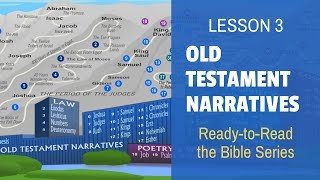Old Testament Narratives
-
(Yahweh is salvation)
Joshua led the Israelites into the land the Lord had promised to Abraham. This book describes some of the difficulties they faced as they forcibly took possession of their inheritance. It concludes with the death of Joshua.
-
(magistrates, rulers)
This book tells the story of the unfaithfulness of the next generation of Israelites. Although they provoked the Lord with their idolatry, He raised up a series of judges to rescue them.
-
(companion)
This is the story of how a Moabite woman came to be the great-grandmother of King David. It offers hope of better days ahead for the nation of Israel.
-
(God has heard)
These two books describe a pivotal time in Israel's history. Samuel served as the last of the judges. He anointed both Saul and David. This marked the transition from Israel as twelve separate tribes to the United Kingdom of Israel.
-
-
(monarchs and sovereigns)
These two books describe how and why the United Kingdom of Israel split in two after the death of Solomon. The Assyrians captured the northern ten tribes. Later the Babylonians conquered Judah. They were in exile for 70 years.
-
Item description
-
(events in chronological order)
These two books repeat many of the stories found in 1 & 2 Kings. The author was trying to help the survivors of the exile rediscover their identity as Jews and remind them of the promises the Lord made to Abraham. The Lord is faithful to His promises, even when people are not.
-
-
(helper)
Ezra was a priest and teacher of the Law of Moses. He taught the Law to the people who had returned to Jerusalem and also deported all the foreign wives and children.
-
(Jehovah comforts)
Nehemiah led the third wave of exiles returning to Jerusalem. He organized the people to rebuild the damaged wall around the city. Then he dealt with the corrupt leadership by enforcing the Law of Moses.
-
(star)
Esther was an orphaned Jewish girl who suddenly rose to a high position in the Persian king's harem. From there she was able to rescue her people from the evil plot of a man named Haman. The Lord had not abandoned His people.
These books give us stories about certain historical characters and events as they relate to the Israelites.
This is history from the viewpoint of the ancient Israelites, beginning with Joshua leading the Israelites into the Promised Land and ending with their return from exile in Babylon.
Read these books like a series of articles about real people, places, and events.
Watch this video for an overview of the books of Joshua through Esther.
Major Characters and Events
Joshua
The man chosen by the LORD to lead the Jews into the Promised Land after the death of Moses.
The Promised Land
God promised Abraham the land of Canaan as his inheritance. This promise was passed down to Jacob. Jacob’s descendants entered the Promised Land 40 years after their exodus from Egypt.
The Walls of Jericho Fall Down
The Promised Land was inhabited by other nations. The Jews had to fight many battles to take possession of the land they had inherited. But the first battle was fought for them by the LORD when He miraculously caused the walls of Jericho to fall down.
The Period of the Judges
The United Kingdom of Israel did not have a king. The Lord raised up a judge whenever Israel needed a military leader to fight their enemies. Israel had no throne or permanent army until after Samuel anointed King Saul.
Gideon
A reluctant judge, famous for his victory over the Midianites with only 300 men and no weapons.
Samson
A powerful judge who killed many Philistines. But he lost his great strength when his hair was cut off.
Samuel
A prophet, a priest, and the last of Israel’s judges. Samuel anointed the first king of Israel, King Saul.
The Kings
Israel was ruled by judges for over 300 years. The people kept insisting that they wanted to be ruled by a king. The Lord warned them through the prophet, Samuel, that a king would demand their money, their land and their sons to serve in his army. But the people still wanted a king. They chose Saul and Samuel reluctantly anointed him as their very first king.
King Saul
The first king of the united Kingdom of Israel. Israel was now officially a nation, not just 12 individual tribes. Saul was not a good king in the eyes of the Lord. He did not do what he was told.
King David
The second king of Israel. David was a poet, a musician, and a fierce warrior. The LORD called David a man after His own heart because he did what the LORD told him to do.
King Solomon
David’s son, was the third and final king of the United Kingdom of Israel. Solomon built the Temple in Jerusalem. He was an extremely wise man who displeased the Lord by turning to idols later in his life.
What’s the difference between a judge and a king?
Israel was a coalition of twelve independent tribes. Whenever they were threatened by a foreign nation, the Lord would have one man appointed as the judge. This judge served as a military leader who would pull all the tribes together to defeat Israel’s enemies. He would return to his regular life after the threat was gone.
The role of a king was very different. A king was an anointed leader who ruled in good times and in bad times. He had a palace, a throne, a crown, and a standing army. He was able to unite the tribes into a single nation.
The Temple
A magnificent building that replaced the Tabernacle the Jews had been using since Moses’ day. The Temple was the place where the people celebrated the annual festivals and daily sacrifices.
The Kingdom Divided in Two
After Solomon’s death, the United Kingdom of Israel divided into the Northern Kingdom of Israel and the Southern Kingdom of Judah. The Temple in Jerusalem was located within the boundaries of Judah.
The Northern Kingdom of Israel
Led by King Jeroboam and made up of 10 of the 12 tribes of Israel. Contrary to the Law of Moses, a new altar was set up there so the people of the north would not have to travel to Jerusalem in the south.
Captured By the Assyrians and Assimilated
The Lord sent prophets to warn the Kingdom of Israel to repent of their idolatry and other national sins or else they would be removed from land by a foreign army. The Assyrians defeated Israel and relocated the people. They assimilated into Assyrian culture and became known as the “lost ten tribes.”
The Southern Kingdom of Judah
Led by Solomon’s son, Rehoboam and made up of the tribes of Judah and Benjamin.
The Temple Destroyed by the Babylonians
The Lord sent prophets to warn Judah to repent of idolatry and other national sins. They had seen what happened to Israel in the north. The Lord protected Judah from Assyria but Judah still did not repent. Then the Babylonians attacked Jerusalem and destroyed Solomon’s Temple.
Judah in Exile in Babylon for 70 Years
The people of Judah were taken away to Babylon where they remained in exile for 70 years. The Lord had sent prophets before the attack to warn the people. Then during the exile He sent prophets to comfort them. He will not be angry with them forever. They will be allowed to return to their land.
The Temple Was Rebuilt
King Cyrus of Persia defeated the Babylonians. He allowed the exiles to go back to Jerusalem. Zerubbabel rebuilt the Temple, Ezra taught the Law of Moses, and Nehemiah rebuilt the city wall.
No Prophets for 400 Years
The book written by the prophet Malachi is the final book of the Old Testament. There were no more prophets for 400 years. Then John the Baptist began baptizing Jews in the Jordan River. John prepared the way for Jesus to begin His earthly ministry.
OT Narratives Part 2
OT Narratives Part 2
JOSHUA .......... JUDGES .......... RUTH.......... 1 & 2 SAMUEL..........1 & 2 KINGS..........1 & 2 CHRONICLES..........EZRA..........NEHEMIAH..........ESTHER
JOSHUA .......... JUDGES .......... RUTH.......... 1 & 2 SAMUEL..........1 & 2 KINGS..........1 & 2 CHRONICLES..........EZRA..........NEHEMIAH..........ESTHER
These 12 books cover the time period from the end of the 40 years of wandering in the wilderness to the end of the Babylonian exile— roughly 1,000 years. Joshua brought the Israelites into the Promised Land where they soon started worshiping idols. When other nations oppressed them, the LORD raised up judges like Gideon and Samson to defeat their enemies and turn the people back to Him. Ruth was the great-grandmother of King David. Samuel was a pivotal figure who served as the last of Israel’s judges. Saul, David, and Solomon were the only kings of the united Kingdom of Israel. Then the kingdom split in two. The northern ten tribes (Israel) were forced out of their land by the Assyrians. The two tribes in the south (Judah) were exiled to Babylon for 70 years. Finally, they were allowed to return to Jerusalem to rebuild the Temple and the wall around the city.
The Story of the Twelve Tribes of Israel
The diagram shows the cycle of Israel’s rebellion while it highlights the Lord’s great patience and mercy. His people were no different than anyone else. If the Lord had chosen any other group of people they would have done the same things. Israel’s history merely demonstrates fallen humanity’s rebellion against their Creator. Human nature has not changed. Waiting another 500 or 1,000 years will not make any difference. We are in need of a Savior and we have been given one in Jesus Christ.
Where would you like to go now?
Law
Poetry & Wisdom







